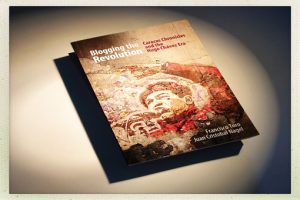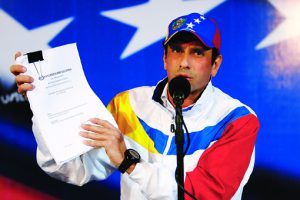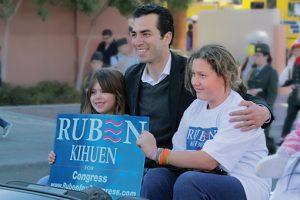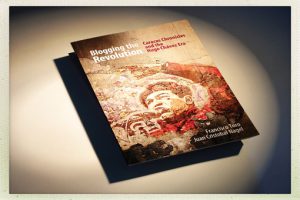An Assessment of the Brazilian Government’s Response to the Protests
The wave of protests that first spread across Brazil in June may have subsided for the time being, but President Dilma Rousseff is still dealing with the political fallout. To recap, after at first not responding to the protests, President Rousseff finally released a statement on June 21 during a ceremony to launch the new … Read more
Monday Memo: Kerry in Brazil and Colombia – Argentine Primaries – Colombia Peace Talks – Chong Chon Gang – Brazil Dictatorship Spying
Likely top stories this week: U.S. Secretary of State John Kerry visits Colombia and Brazil; Argentines vote in congressional primary elections; FARC and Colombian government hail progress in peace talks; Panama concludes its inspection of the North Korean ship Chong Chon Gang; and documents reveal details of Brazilian dictatorship-era spying. John Kerry Travels to Brazil … Read more
Former San José Mayor Leads Presidential Poll in Costa Rica
Only six months away from the February 4, 2014, presidential election in Costa Rica, the former mayor of San José and official candidate of the Partido Liberación Nacional (National Liberation Party—PLN), Johnny Araya, holds a significant lead over his rivals in the most recent poll. According to a local Borge y Asociados poll released on … Read more
Monday Memo: Gay Marriage in Uruguay – Venezuela and Paraguay – Cuban Prisoners – Immigration Reform – Carandiru Prison
Likely top stories this week: Gay marriage begins in Uruguay; Venezuela is not invited to the Paraguayan president’s inauguration; Amnesty International demands the release of Cuban prisoners; U.S. House of Representatives Republicans reject Senate approach to immigration reform; Brazilian police officers are sentenced for the 1992 Carandiru massacre. Same Sex Marriage Starts in Uruguay: The … Read more
Monday Memo: Peru Protests – Bachelet and Matthei – Colombia Peace Talks – Cholera in Haiti – Mexican Vice-Admiral Killed
Likely top stories this week: demonstrators protest in Peru; a Chilean lawyer investigates the death of Michelle Bachelet’s father; FARC–Colombian government peace talks resume; a new report faults the UN for Haiti’s cholera outbreak; and assailants kill a Mexican vice-admiral. Protesters and Police Clash in Peru: Thousands of demonstrators clashed with hundreds of riot police … Read more

Blogging the Revolution: Caracas Chronicles and the Hugo Chávez Era by Francisco Toro and Juan Cristobal Nagel
Venezuela has been on a wild ride since Hugo Chávez was elected president in 1998. Now that the Comandante—as he liked to be called—has left us, things could get loonier a lot faster. That’s one reason why Caracas Chronicles, an English-language blog that has provided a running narration since 2002 of the Chávez era, will … Read more

The Limits of Legacy: The Post-Chávez Challenge and Electoral Legitimacy
In April 14, Venezuelans turned out en masse for a special presidential election. More than 79 percent of the electorate voted to fill the 2013–2019 term left vacant by Hugo Chávez’ March 5 death from cancer. The photo-finish surprised and captivated the country, with interim President Nicolás Maduro defeating opposition Governor Henrique Capriles by a … Read more

Politics Innovator: Ruben Kihuen, The United States
Ruben Kihuen, 33, is used to winning. As a rising Mexican-American politician in Nevada—where Latinos have played a major role in deciding the last two U.S. presidential elections—Kihuen has attracted attention far outside his home state. And with good reason: both Hillary Clinton and Barack Obama courted him during their 2008 presidential campaigns, and Kihuen’s … Read more

Fresh Look Reviews
Fresh, unique perspectives on recent books from across the hemisphere originally published in English, Spanish and Portuguese.
Monday Memo: Chilean Presidential Candidates – Pope in Brazil – Ambush in Colombia – U.S. Immigration – Venezuela-U.S. Relations
Likely top stories this week: Evelyn Matthei will be the UDI’s new candidate in Chile’s presidential election; Pope Francis I arrives in Brazil; Colombian government sends troops to Arauca; U.S. lawmakers debate the KIDS Act; Venezuela ends its attempt to normalize relations with the U.S. Chile’s New Presidential Candidate: The Unión Demócrata Independiente (Independent Democratic … Read more
Candidate Reshuffle in Chile’s Presidential Election
Former Economy Minister Pablo Longueira of the Independent Democratic Union (Unión Demócrata Independiente—UDI) withdrew from the Chilean presidential campaign on Wednesday just weeks after winning the June 30 primary of the incumbent Alliance for Chile (Alianza por Chile) coalition. His son, Juan Pablo Longueira, informed the press that his father had been suffering from severe depression and could no longer be a part of the race. The election will be held on November 17, 2013. The Alianza coalition must now overcome … Read more
La prisión preventiva desvirtuada
Cuando se considera a una persona como posible responsable de un delito en un procedimiento judicial, el fiscal puede solicitar su detención provisional, esto es, que vaya a prisión hasta que se le juzgue y decida que es culpable—o que no lo es. Ni el señalamiento que haga la policía, ni siquiera la acusación que … Read more
Rousseff Again Calls for a Plebiscite on Political Reforms
On Wednesday, Brazilian President Dilma Rousseff reiterated her proposal for a plebiscite on reforms to address citizen discontent over corruption and public spending that have fueled massive protests since June. Rousseff first proposed a plebiscite on June 24. According to her plan, voters would select from a menu of options to overhaul the nation’s political … Read more
Growing Pains: Former Student Leaders Step into Electoral Politics Amid Continuing Mobilization in Chile
In 2011, a nationwide reform movement swept Chile, with teachers, students and their families filling the streets to demand free, quality public education. As student marches and police crackdowns continue into 2013, some former leaders of the movement are transitioning to electoral politics, looking to win seats in parliament come November. View an exclusive slideshow … Read more
Monday Memo: Mercosur and Europe – Mexican Reforms – Guantánamo – Peruvian Legislator Arrested – Guatemala Police Station Massacre
Likely top stories this week: Mercosur leaders pledge to withdraw envoys from Europe; Mexican opposition demands electoral reforms; some Guantánamo prisoners break their hunger strike; Peruvian legislator Nancy Obregón to be investigated for Shining Path ties; four are arrested after Guatemalan police station massacre. Mercosur Countries to Withdraw European Ambassadors: At the Mercosur summit in … Read more


